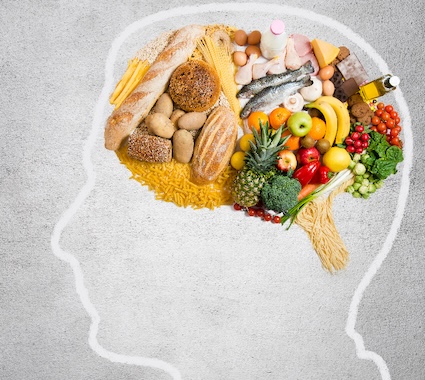Can what you put on your plate today help protect your brain tomorrow? The highly-researched MIND Diet (Mediterranean-DASH Intervention for Neurodegenerative Delay) is designed to lower the risk of dementia and support long-term cognitive health.
Developed by researchers at Rush University in Chicago, the MIND Diet blends the Mediterranean and DASH dietary methods and sharpens the focus on brain health by emphasizing specific foods and nutrients most associated with cognitive resilience. These include antioxidants, vitamins, and anti-inflammatory constituents – elements believed to combat oxidative stress and inflammation, both critical in brain aging.
To put the MIND Diet into practice, focus on the foods shown to benefit cognition while limiting those associated with increased risk.
Prioritize these foods and serving targets:
 Leafy greens (spinach, kale, collards): Rich in vitamin K, folate, and antioxidants linked with slower cognitive decline. Eat at least 6 servings per week.
Leafy greens (spinach, kale, collards): Rich in vitamin K, folate, and antioxidants linked with slower cognitive decline. Eat at least 6 servings per week.- Other vegetables: A variety adds fiber and a broader mix of phytonutrients, so eat at least 1 serving daily.
- Berries: Blueberries and strawberries high in flavonoids support brain health, so eat at least 2 servings per week.
- Nuts: Provide healthy fats and vitamin E; eat about 5 servings per week.
- Beans and legumes: Important for adding fiber and plant protein, eat at least 3 times per week.
- Whole grains: Support vascular health and steady energy with 3 or more servings daily.
- Fish: Source of omega-3s that support brain and heart, eat at least once weekly.
- Poultry: Use this lean protein in place of red meat at least twice weekly.
- Olive oil: Use as the primary cooking oil as it is rich in monounsaturated fats and polyphenols.
- Wine: Enjoy one small glass per day only if you already drink and it is appropriate for you.
Limit these unhealthy foods:
- Red and processed meats: fewer than 4 servings per week.
- Butter and stick margarine: less than 1 tablespoon per day.
- Cheese: no more than 1 serving per week.
- Pastries and sweets: fewer than 5 servings per week.
- Fried or fast foods: no more than 1 serving per week.
Science-based cognitive health advice: ‘Keep Sharp: Build a Better Brain at Any Age’
The science behind the MIND Diet
Observational studies noted in the Rush University report have consistently linked higher adherence to the MIND Diet with a significantly lower risk of Alzheimer’s disease – up to 53% lower in those with the highest adherence, and about 35% lower even with moderate adherence.
Cohort studies, such as one by Harvard School of Public Health, also reveal that higher MIND scores correlate with slower cognitive decline, better memory, and even larger brain volume in older adults. Results from randomized controlled trials have been more mixed. A 2023 trial involving overweight adults aged 65 and older found that while both MIND diet and control groups improved cognitive performance, the MIND group’s advantage did not reach statistical significance over three years. Still, the evidence overall points to the MIND Diet as an effective preventive approach.
A recent population-based study, the Rotterdam Study,- with follow-up as long as 15 years, confirmed that higher MIND adherence was associated with reduced risk of dementia in the early years of follow-up, though this protective association decreased over longer periods.
Three experts who have studied the potential for diet to help prevent dementia spoke to the host of BBC’s “The Food Chain” podcast. Professor Christy Tangney of Rush University System for Health in the United States, co-creator of the MIND diet; Anne-Marie Minihane, Professor of Nutrition and Genetics (Nutrigenetics) at Norwich Medical School at the University of East Anglia in the UK; and Dr Lizette Kuhn, a dietitian in Pretoria, South Africa. While exploring multiple ways to link diet and cognitive health, the experts emphasized diets rich in whole, plant-based foods, to reduce the oxidative stress and inflammation linked to brain aging, which is consistent with the MIND Diet’s scientific foundation.
The MIND Diet stands out for its balance: it is less restrictive than strict Mediterranean or DASH plans because it focuses only on the most brain-beneficial elements. You don’t have to change your diet completely overnight – adhering to the diet even moderately can translate into lower dementia risk and may slow the progression of cognitive decline. Whether you’re cooking for yourself or planning meals for family members, incorporating its principles can support both your brain and overall health.





